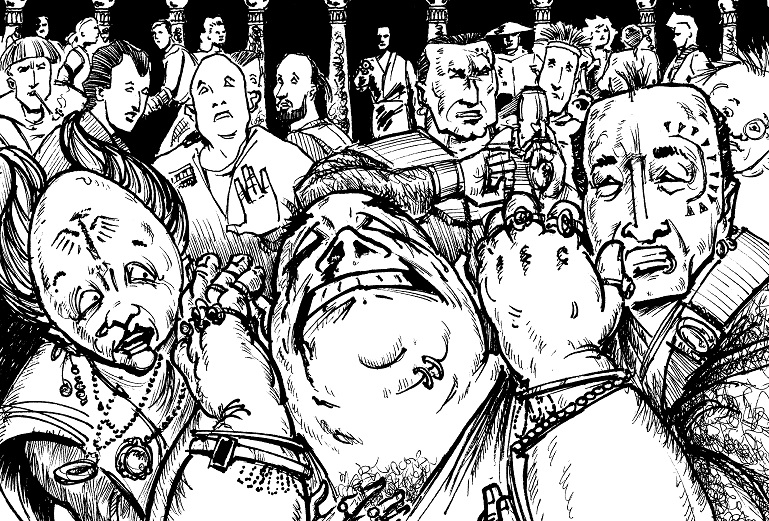19 Apr Fading Suns Designer Diary – April 2018

Last month we talked about “social combat,” what we call the influence system.
One of the effects of influence is to impose a state onto a character. This is a mental or social condition that affects the character’s behavior and perhaps even their thoughts, attitudes, and beliefs. They’re most often temporary — fleeting, even. But some can last long enough that therapy might be required to resolve them.
I thought we’d reveal a bit more about those states for this month’s diary. Please realize that this system is still a work in progress. There’s a lot more detail than we reveal here, but it would be tedious at this stage to talk in too much depth about victory-point costs and other such specific rules.
We hope you’ll enjoy this glimpse.
States
States are effects that are imposed upon characters through various means, from special weapon effects (i.e., a stunner pistol causing a target to become Stunned) to characters influencing other characters (i.e., using the Impress command maneuver to make a target become Commanded) to bearing more high-technology than you can psychologically handle (i.e., an energy shield’s tech compulsion is to make its user Reckless).
(Wait — tech compulsion? What’s this? We’ll reveal more in a future diary.)
Intensities
Most (but not all) states are part of a spectrum from mild intensity to major intensity to severe intensity. It costs VP to place a target in any of these states.
Persistence
States don’t last forever. They come and go. Each state has a specific time frame — its persistence — during which it is in effect, after which it simply goes away. This can range from Instant (one round) to even Chronic (requires therapy to resolve).
Someone in a particular state can take a primary action to try to shake it off (a Focus skill maneuver) and end its effects before its duration is over.
Using States
The influence system isn’t magic. It’s designed to start modest: influence maneuvers (like befriend, convince, deceive, etc.) impose only mild states. Characters can then build on those states to intensify them (up to major and severe) as well as reinforce them (increase their persistence). But they have to work at this.
Occult powers (like psi and theurgy) can skip over the modest part and go straight into delivering a major or severe state.
States delivered by weapons, such as a stunner pistol’s Stunned or a flamegun’s Distressed, can be mild or major, but are rarely severe.
Sample Physical States
Dazed (Mild)
[Dazed • Stunned • Unconscious]
Your coordination is awry. You suffer a -2 penalty on rolls involving physical actions and perception.
Deafened (Major)
You cannot hear. You cannot succeed with any activity or perception that requires hearing. This includes any type of mental or social influence that requires you to hear your target. On the bright side, sonic attacks, such as from a screecher pistol, are unfavorable.
Disoriented (Major)
Your perceptions are seriously awry. Your actions are directed at random targets, instead of the person(s) you think you’re targeting.
Fatigued (Major)
[Enervated • Fatigued • Incapacitated]
You are extremely weak. You suffer a -4 goal-roll penalty on all actions involving physical activity. In addition, you must spend 1 VP to perform any action that requires a roll, even if there is normally no cost. You spend this before the roll is made.
Mangled (Major)
You have suffered a wound that requires surgery before you can heal. Someone with Remedy skill can operate on you to remove the Mangled state, which then allows you to heal via Revival, Respite, or other medical care. Elixir can also heal Vitality regardless of the Mangled state. Certain theurgic rites can ignore the Mangled state to heal Vitality and even remove the state, allowing for natural healing.
Sample Mental States
Afraid (Major)
[Nervous • Afraid • Terrified]
You feel under threat. You suffer a -4 goal-roll penalty to undertake any action except perception-oriented ones or to dodge or stonewall, as you constantly scan your environment for threats.
Commanded (Mild)
[Commanded • Compelled • Controlled]
You have been given an order and must execute it, although you don’t have to like it. If this state’s duration ends before you can accomplish the order, then you no longer need to obey it.
Deceived (Mild)
[Deceived • Duped • Deluded]
You’ve been hoodwinked but you don’t know it. You believe that your influencer is telling the truth, so long as what they say has some plausibility. You won’t, however, necessarily believe outrageous statements (i.e., the Prince of your house is a hironem disguised as a human). You are inclined to fall for whatever your deceiver says: you won’t spend VP to boost your Resistance against any persuasion influence they attempt against you.
Elated (Major)
[Wowed • Elated • Overjoyed]
You’re full of good cheer. Your persuasion attempts against others gain a +4 goal-roll bonus, as your demeanor is nonthreatening and infectious, but you find it hard to coerce others: -2 goal roll. It’s an effort for you to consider physically attacking someone. Unless it’s for self-defense, you must spend 1 VP before you make any physical attack rolls.
Reckless (Major)
[Impulsive • Reckless • Heedless]
You throw all caution to the wind. You act first in the initiative queue but you cannot spend VP to raise your Resistance and any dodge or stonewall maneuvers you perform are unfavorable. In addition, your descry rolls (made by the GM) to notice what’s going on around you are unfavorable.
Sample Social States
Befriended (Mild)
[Befriended • Bolstered • Encouraged]
You like your influencer. Your attitude moves left on the Attitude Chart by one step. For instance, if you were neutral toward them, you’re now friendly. You will not initiate a physical attack or coercion against your influencer, although you can respond if they attack or coerce you.
Converted (Major)
[Convinced • Converted • Indoctrinated]
You adopt the belief, idea, or scheme that your influencer has conveyed to you. What’s more, you want to spread that idea by proselytizing. In non-stressful moments you will attempt to convince allies and friends of its worth.
Humiliated (Major)
[Mocked • Humiliated • Mortified]
You are a laughing stock. You suffer a -4 goal-roll on any influence attempts. If you were an ally or friend to your influencer, you are now neutral for as long as this state lasts and until they apologize. If you were unfriendly, you’re now an enemy. If you were an enemy, you might challenge your influencer to a duel or plot their demise somehow.
Inspired (Major)
[Roused • Inspired • Incited]
You are greatly moved by your influencer (or their performance) and take their words or actions as a call to action. You will seek to enact the ideal they communicated. It might be harassing foreigners, inveighing against the Hazat, or volunteering at a soup kitchen. Until you’ve done something concrete to express this ideal you will suffer a -2 goal-roll penalty on actions that don’t contribute toward its expression.
Shamed (Major)
[Castigated • Shamed • Penitent]
You are guilt-ridden, a sinner in the hands of an angry god. You will truthfully answer questions put to you by your influencer in detail, so long as it concerns you or your immediate associates, but you won’t reveal deep secrets of your faction (such as troop movements, locations of secret bases, identities of spies). Questions whose answers might put your allies in deadly peril might trigger a reflexive shake it off roll.
More to Come
This is just a peek at what’s in Fading Suns 4th edition. Check back next month for even more reveals and maybe some news and gossip from the Known Worlds in 5018. Thanks for reading!
— Bill Bridges, Product Line Manager




